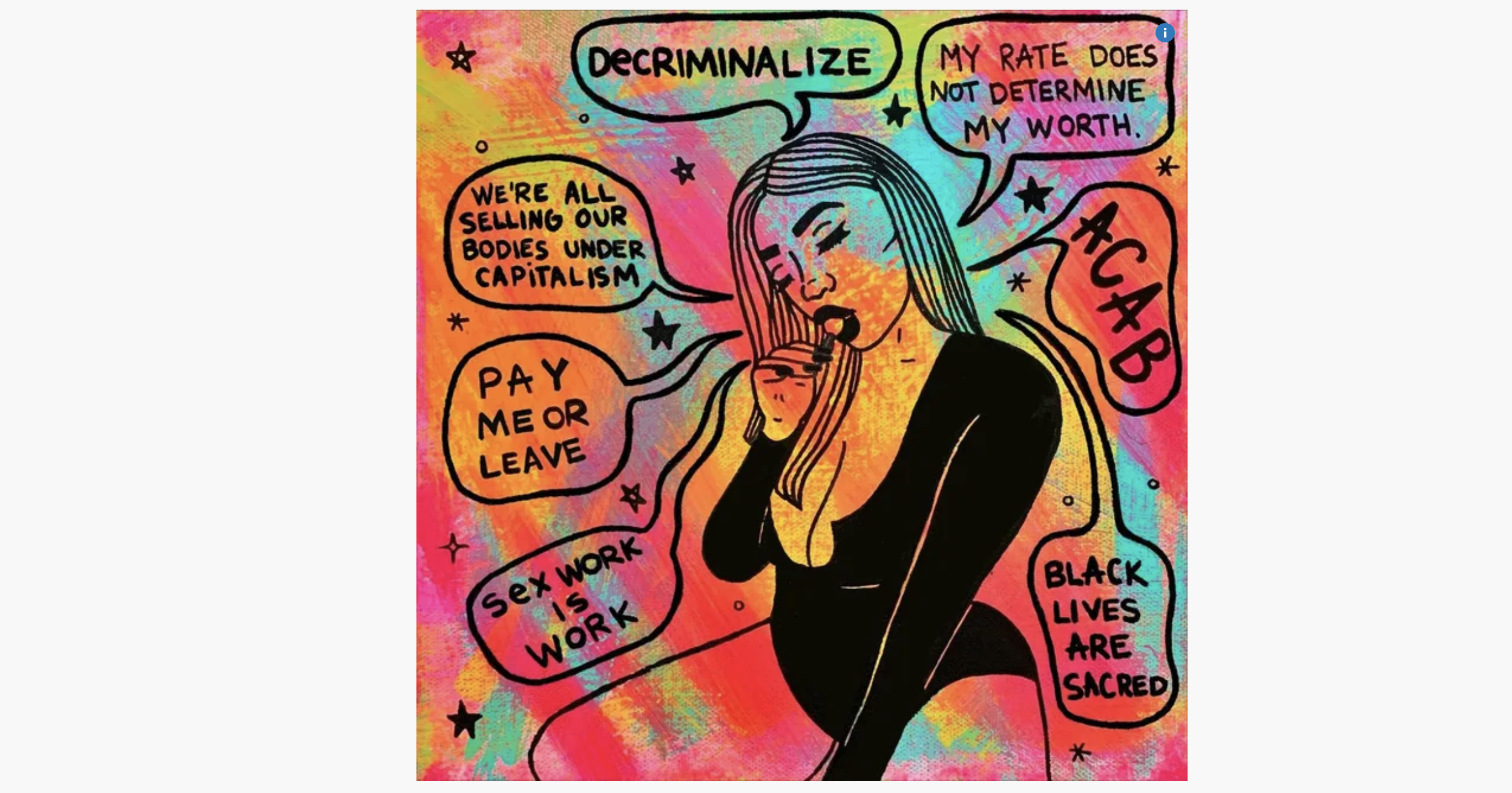By Beatriz Baleeiro
Hamilton Spectator
‘Working It: Sex Workers on the Work of Sex,’ just launched in March, and includes first-person essays, interviews, poetry, drawings, mixed media collage and photographs.
Imagine opening your own business. You have full control over your hours, freedom to choose what services are offered, determine the prices, and select customers. The catch: No one is legally allowed to purchase your services.
That’s the reality for Jelena Vermilion and the artist who goes by the name Raging FemBot (who did not want her real name used), two Hamilton business owners who provide sexual services to their customers.
Vermilion, 29, has been in the sex trade for more than 10 years, and advocates for the decriminalization of sex work as the executive director of Sex Workers Action Program Hamilton (SWAP).
Along with a brothel worker in Australia, First Nation survivors of the Canadian child welfare system, and an Afro-Latina single parent, Vermilion collaborated on a book that shows the different experiences of those who have worked as sex workers.
:format(webp)/https://www.thespec.com/content/dam/thespec/entertainment/books/2023/04/29/sex-workers-rights-expressed-through-the-arts/working_it.jpg)
“Working It: Sex Workers on the Work of Sex,” just launched in March and is available for purchase online for $17.95 physical copy or $8.95 for the e-book version.Jelena Vermilion
“Working It: Sex Workers on the Work of Sex,” just launched in March, and includes first-person essays, interviews, poetry, drawings, mixed media collage and photographs. The book is described as an “intimate portrait of the lives of sex workers.”
Vermilion said that going into sex work is a “choice” people make. “The fact that people continue to make that choice in spite of stereotypes against sex workers is indicative of the underlined truth that, sex work is work, and it is real work.”
Published by PM Press and edited by Matilda Bickers, peech breshears, and Janis Luna — the book was postponed for two years because of COVID.
In one of the art works for the book — a purple heart with animal prints in the background — the text reads: “Protect/Believe/Listen To/ Support/ All Sex Workers Now!/ Rights Not Rescue.” According to Vermilion, this represents the resilience and bravery of sex workers, who are targeted for murder and violence due to the criminalized environment they live in.
“It’s important to centre the perspectives and narratives of sex workers,” Vermilion said. “Because often in the media they are infantilized and treated as victims and criminals.”
:format(webp)/https://www.thespec.com/content/dam/thespec/entertainment/books/2023/04/29/sex-workers-rights-expressed-through-the-arts/jelena_vermilion.jpg)
Jelena Vermilion.DANIELLE DONVILLE/YWCA
Since 2014, Bill C-36 has criminalized prostitution, which prohibits purchasing sexual services and makes the prostitution transaction illegal. The bill does not criminalize the sale of sexual services but bars the advertisement and purchase of those services.
The bill is said to “protect sex workers who receive money from the sale of their own sexual services from criminal liability” and its approach is “intended to protect the vulnerable people targeted by prostitution, the communities in which prostitution is practised and society itself by sending a strong message that everyone is entitled to dignity and respect.”
SWAP is one of 26 sex worker rights’ organizations currently suing the federal government to decriminalize sex work in Canada.
“Sex workers have different kinds of struggles and live in different forms of marginality,” Vermilion said. “Sex workers themselves who live in poverty, and often struggle with these kinds of obstacles will choose to do sex work.”
Back in 2019, RagingFemBot — sex worker, psychotherapist, and visual artist — started a page on Instagram to express the “trials and tribulations” of sex work through art while advocating for the decriminalization of sex work.
The artist, 27, said her art speaks to sex workers and the struggles they face, while bringing a mix of humour, sadness, compassion and “a multitude of emotions.”
The artwork, styled with flowers and bright colours comes with messages such as “My rate does not determine my worth,” “Pay me or leave” and “We are all selling our bodies under capitalism.”
The illustrations quickly gained positive and negative attention on RagingFemBot’s social media platforms.
“I had some engagement (on social media) with people where they are coming from quite a place of hate and don’t really think of sex workers as people or deserving of rights and labour protections.”
Though hateful comments came from non-sex workers, her art aims to help other folks in the sex trade communicate with their customers better.
“They can share the art on their social media and their customers might see (the posts) and allow them to hopefully view sex work and workers in a different way.”
Raging FemBot has been drawing since she can remember, and her passion for portraying women in her art carried into her recent work.
She said women are the “main characters in her art” and sex work became the subject of her work naturally.
The name, RagingFemBot, comes from feminine, girly, and flowery energy, which express her passion for her art and “Raging,” represents the anger about misconceptions of sex work.
“Working It: Sex Workers on the Work of Sex” is available for purchase online for $17.95 physical copy or $8.95 for the e-book version.
RagingFemBot’s art is available at instagram.com/ragingfembot and the art distribution through apparel and accessories can be found on rightsnotrescue.ca.






